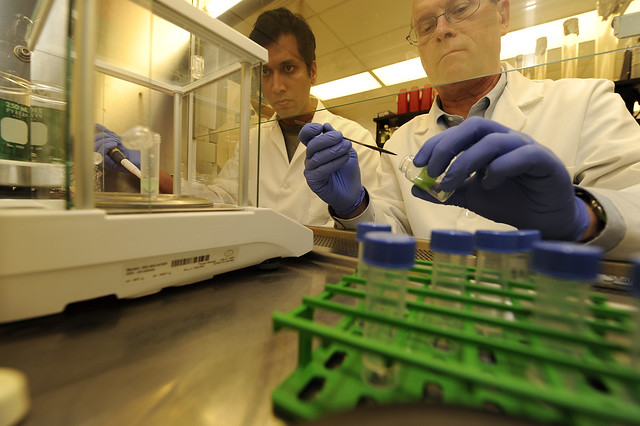Nutrivert company wins Cade Prize for Auburn-developed antibiotic replacement technologies
Article body
A company formed on commercializing antibiotic replacement technologies developed by and with Auburn University researchers has become the first out-of-state winner of Florida’s highly competitive Cade Prize for Creativity and Innovation.
Nutrivert LLC received the award recognizing a growth-promoting technology developed by Bernhard Kaltenboeck, professor emeritus in the Department of Pathobiology in the College of Veterinary Medicine, and Nutrient scientists. The Cade Prize provides $21,000 and in-kind legal services to support further research.
Antibiotics have long been used to promote growth in production animals, but such broad use has been tied to the development of resistant bacteria. The market, and some governments, are pushing for a replacement for antibiotics in agriculture.
The co-owned technology is a synthetic compound that mimics a cell wall component released by all bacteria. This postbiotic compound (i.e., molecule derived from bacteria) reduces inflammation of the gut in the animal and thereby promotes better growth and feed conversion.
The Auburn technology was developed as a follow-up to an anti-inflammatory microparticle formulation that reduces body-wide inflammation in the host animal, and was developed by Kaltenboeck and former Auburn veterinary colleague Erfan Chowdhury together with former Auburn chemical engineering colleagues Ram Gupta and Courtney Ober.
Nutrivert was formed on the foundation of these technologies that are licensed through Auburn’s Office of Innovation Advancement and Commercialization, or IAC.
“This was an Auburn-built effort,” said Brian Wright, director of commercialization with IAC. “IAC engaged Horace “Hod” Nalle and Pete Selover as animal health consultants. We introduced this project to them, then introduced them to Dr. Kaltenboeck, and the nucleus of the company was born.
“Further demonstration was needed before a company could be started, and, in 2017, Dr. Kaltenboeck received a $39,000 grant from Auburn’s LAUNCH Innovation Grants Program, which was created to fund exactly that kind of work. The funding led to the key demonstration of the technology, triggering the license agreement and launch of Nutrivert in early 2018.”
Testing to date has shown the potential for these products to promote growth in animals in similar or possibly even superior ways to antibiotics, without the risk of producing resistant strains, all for a similar cost, according to Wright.
“I am extremely proud that the technology leading to this product was created and validated in the Department of Pathobiology in the College of Veterinary Medicine,” said Dean Calvin Johnson.
“The potential impact of this creative work could reduce the use of antibiotics for growth-promoting purposes in agricultural operations throughout the world. From the perspective of antimicrobial stewardship and reducing suspected factors that contribute to the emergence of antimicrobial resistance, this could have a major impact on human and animal health.”
James Weyhenmeyer, Auburn University vice president for research and economic development, added, “The Cade Prize is a very prestigious honor. This recognition is a reflection of Auburn’s commitment to solve real-world problems through discovery and innovation.”
While the Nutrivert product has not yet reached the commercial agricultural marketplace, company officials said early studies have shown this postbiotic helps farm animals grow to a target weight on 5-10 percent less feed. They added the Nutrivert product will always be 100 percent free of antibiotics.
Related Media
Media interested in this story can contact Communications Director Preston Sparks at (334) 844-9999 or preston.sparks@auburn.edu.
Auburn University is a nationally ranked land grant institution recognized for its commitment to world-class scholarship, interdisciplinary research with an elite, top-tier Carnegie R1 classification, life-changing outreach with Carnegie’s Community Engagement designation and an undergraduate education experience second to none. Auburn is home to more than 30,000 students, and its faculty and research partners collaborate to develop and deliver meaningful scholarship, science and technology-based advancements that meet pressing regional, national and global needs. Auburn’s commitment to active student engagement, professional success and public/private partnership drives a growing reputation for outreach and extension that delivers broad economic, health and societal impact.





